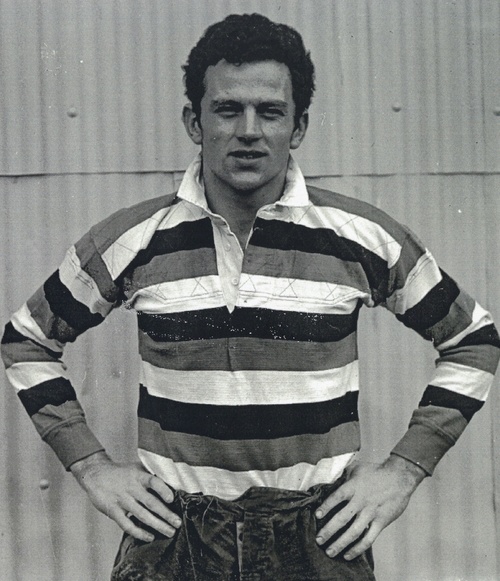
Auction: 18003 - Orders, Decorations and Medals
Lot: 297
'One of a Kind! A speedy and strong winger, with ability to find an opening. A very strong head-on tackler. First game for Bath v Bridgend 29 October 1966, making an immediate impact. His scoring spree of 15 tries in his first season was interrupted by a hairline jaw fracture against Sheffield on 28 March 1967. In 1966-67, his try count was only exceeded by Peter Sibley with 21. Peter Sibley wrote: "The biggest asset was the arrival of maverick ex Royal Marine officer Ian Duckworth, a fast, powerful runner on the wing, with a cover tackle to seal the win at Rosslyn Park that I described as an 'exocet'. He was a law unto himself, spending the night with his motor bike in the changing room before some games, but what a player."'
Peter Hall, historian of Bath Rugby Football Club, remembers Ian Duckworth (1945-1983).
The poignant Borneo G.S.M. awarded to Lieutenant I. F. Duckworth, Royal Marines
An outstanding sportsman who narrowly missed an England cap, Duckworth served in Borneo with 40 Commando during the clandestine offensive known as 'Operation Claret'
General Service 1962-2007, 1 clasp, Borneo (A/Lieut. I. F. Duckworth. R.M.), nearly extremely fine
Ian Fagan Duckworth was born at Wigan, Lancashire on 5 March 1945, the son of John Fagan Duckworth, a naval officer. From 1958 he attended Blundells School in Tiverton, where he excelled at sports and was a keen rugby player.
He joined the Royal Marines on 10 September 1962, straight from school, under the Young Officer training scheme. Stationed at R.M. Deal, he played in the Combined Services team against the All Blacks at Twickenham on Boxing Day 1963, losing 23 to 9. His post-match report featured in Globe & Laurel (February 1964, 56). He also set new Navy Junior records for the 220 yard and 440 yard sprints.
Duckworth joined 45 Commando in Aden on 17 August 1964, with the rank of 2nd Lieutenant. Promoted to Acting Lieutenant (London Gazette, 11 December 1964, refers), he returned home in March 1965 to attend the School of Infantry Training at Warminster. Whilst there he 'incurred the displeasure' of the Commandant General by his poor behaviour. He nonetheless passed the Jungle Warfare Course and was posted to Singapore with 40 Commando. The unit served in Borneo from July to November 1965 as part of Operation "Claret", a highly classified campaign intended to roll back President Sukarno of Indonesia's guerrilla forces. With Soviet arms and advisers, Sukarno aimed to create a unified Borneo by bringing Sarawak, Brunei and Sabah (formerly British North Borneo) under his control. He resented Britain's continued hold over the region and watched with envy as Brunei's oil fields brought the sultanate untold prosperity, serving to highlight his own poor economic performance (he rejected capitalism). Sukarno's guerrillas made frequent incursions into Sarawak, crossing the Kalimantan border.
40 Commando took up advanced positions in the far west of Sarawak - part of modern Malaysia - near the port of Lundu, with the close support of H.M.S. Bulwark. Harold Wilson's Labour government approved cross-border operations by British troops to a depth of 20,000 yards, on the proviso that no enemy soldiers could be captured alive or dead. Outwardly, the intention was to thwart enemy offensives. 40 Commando thus fought in extremely trying circumstances and were denied air support for fear of escalating the conflict. It must have been a relief when, on 1 October, Indonesia's domestic tensions resulted in a military coup which ousted President Sukarno. Indonesian raids became less frequent, and a peaceful settlement was reached. Duckworth even found time for rugby. It was not until 1974 that Operation "Claret" was publicly disclosed by Britain.
Duckworth was advanced to Lieutenant on 10 April 1966, joining 42 Commando in Singapore (see Globe & Laurel, August 1966, 218). Placed on terminal leave from the Royal Marines on 13 October, he bought a house in Exeter and joined Bath Rugby Football Club, scoring 73 tries in 130 1st XV games. He was very unlucky to miss an international cap. On the eve of the 1967 England v Wales game at Twickenham, Bath R.F.C. were staying in London ahead of a Saturday game against the Metropolitan Police. Dickie Jeeps, chairman of the England selectors, telephoned Bath's secretary asking if Duckworth could report to Twickenham following an injury to the England wing. As far as the secretary knew, Duckworth was in bed with flu and could not be contacted. The place went instead to Keith Savage of Northampton. Duckworth was bitterly disappointed.
Employed as a social worker, he married Sandra Kathleen Wood in 1978. The pair moved to Stirling in Scotland, living at 5 Park Place. He gained a reputation as an expert rock climber, but developed a severe mental illness. He died suddenly on 1 September 1983, his death certificate stating: 'found dead on Stirling/Perth railway line, near Greenloaning'. Below 'multiple injuries' and 'run over by train', cause of death is given as 'chronic mental depression'. He was aged just 38.
Ian Duckworth's son Sean, born on 17 January 1980, was to play rugby as a full back for Bristol; sold with a file of copied research.
Recommended viewing:
https://www.bbc.co.uk/programmes/p00hhrf6
Subject to 20% VAT on Buyer’s Premium. For more information please view Terms and Conditions for Buyers.
Sold for
£750




